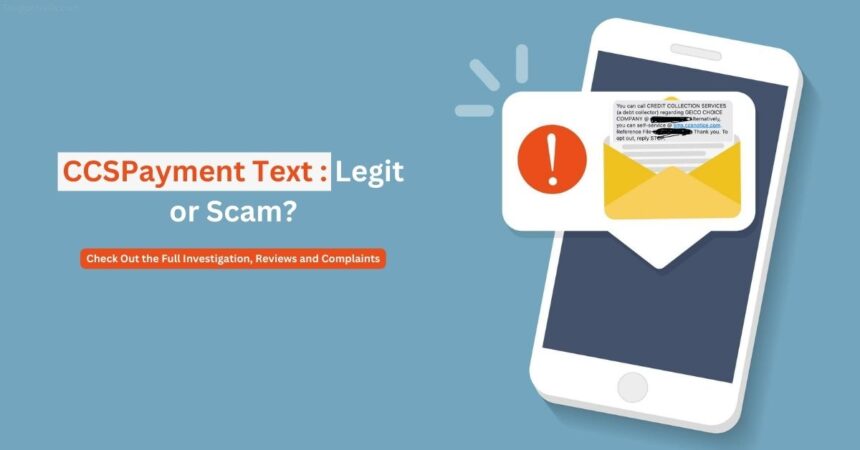Unexpected text messages from Credit Collection Services (CCS) claiming you owe money can cause confusion and anxiety. You may wonder – is this legitimate or some kind of scam?
This article examines suspicious messages that appear to be from debt collector Credit Collection Services’ payment portal CCSPayment. We’ll overview common debt collection frauds, provide examples of suspicious texts consumers have received, summarize applicable laws, and most importantly, share tips to protect yourself.
Overview of CCSPayment Debt Collection Text Message
First, CCSPayment.com is the real online payment portal for Massachusetts-based Credit Collection Services (CCS), one of the largest debt collectors in the country. Credit Collection Services (CCS) purchases unpaid debt from creditors then aggressively pursues payments.
Credit Collection Services may show up on your credit report as “ccs collections,” “ccs payment,” “credit collection servic,” “ccs credit collection services,” “credit collection services norwood ma,” “ccs usa,” “ccs collection,” “ccs notice,” or “ccspayment.” These variations indicate the presence of a debt collection account associated with Credit Collection Services. Keep an eye on your credit report for these terms and address any issues accordingly.
The text message look like the below text,
You can call CREDIT COLLECTION SERVICES (a debt collector) regarding LABCORP COMPANY @ ******. Alternatively, you can self-service @ sms.ccspayment.com. Reference File #*******. Thank you. To opt out, reply STOP.
However, the Better Business Bureau warns that scammers are taking advantage of CCS’s reputation to run debt collection cons. Through complex phishing techniques, they send fake text messages and emails redirecting victims to bogus websites engineered to steal money and personal information.
So how can you discern real CCS notifications from frauds? Let’s break it down.
How Do Scammers Operates Fake Scams?
The scam usually starts with an unsolicited text message stating you owe a debt and can pay it through CCSPayment. While seeming legitimate, with filed account numbers and everything, subtle discrepancies suggest fraud.
The texts provide a URL linking not to the real CCSPayment.com but a sophisticated fake site. Designed to mimic the real payment portal, it asks for financial or personal details—credit card info, bank account logins, SSNs.
By inputting any data, you give scammers access to your identity, bank accounts, or worse. Some immediate red flags:
- Suspicious links – hover to preview the actual fraudulent URL destination
- Requests for unusual forms of payment – wire transfers, cash apps, gift cards
- Threatening language – threats of lawsuites or jail time
- Requests for sensitive personal information
If you doubt the validity, don’t click anything. Contact the company directly through official channels to verify if the debt notice is real.
Victim Complaints and Review On Credit Collection Services
Hundreds of similar complaints have been submitted to the Consumer Financial Protection Bureau and Better Business Bureau about fake CCS Payment texts. Here’s what some had to say:
I received a text stating I owed a debt to a Laboratory Company, but I did not recognize said company and believe this to be a scam.
CFPB Complaint
Received text messages stating I owed money to metro by t-mobile which i do not have…this is clearly a fraud attempt.
BBB Review
[The text contained] a debt that had already been paid directly to the creditor and no longer owed.
CFPB Complaint
While a few people confirmed the notices connected to legitimate but inaccurate insurance and medical debts, most texts raised scam alarms for those with no recollection of the alleged debt.
Applicable Laws and Regulations
Under the Fair Debt Collection Practices Act (FDCPA), debt collectors have limitations around how they recover debts. They cannot lie, make threats (like jail time), call excessively, tack on invalid fees, etc. Many suits have been filed against CCS specifically for FDCPA violations like inaccurate credit reporting or failure to validate debts.
If collectors violate rules, consumers can dispute items on credit reports or sue to recover damages. You can submit complaints to the Consumer Financial Protection Bureau or Federal Trade Commission to trigger investigations against shady practices too. Know your rights when dealing with collectors.
Is CCSPayment Fake or a Real Debt Collectors?
This causes confusion. Again – the actual CCSPayment portal is legitimate, run by real debt collector Credit Collection Services. But clever scammers mimic everything to trick victims into paying them either online or via money transfers.
Safest bet is to verify where texts originate from and if alleged debts are yours or not.
How to Avoid Debt Collection Scams
While scams grow more advanced, you can spot signs through vigilance:
- Don’t click suspicious links or provide personal/financial information easily
- Call or write the company directly through official contact info to confirm debts
- Check your credit reports regularly for errors
- Learn to recognize phishing techniques like urgency, threats, or requests for sensitive data
- Report fraud texts to authorities – it can trigger investigations
Stay proactive and you can minimize being deceive. Confirm debts through reliable channels before paying alleged creditors you don’t recognize.
The Bottom Line
Get ahead of surprise debt notices by reviewing credit reports often and knowing companies you owe. Debt collectors have limitations, but scammers do not – stealing your information or money is their only motive.
Protect yourself by analyzing any questionable texts thoroughly before providing details or payments. Report frauds to help prevent more victims too. Stay vigilant and exercise your consumer rights against harassment.
































